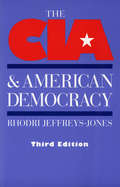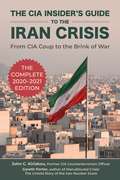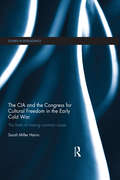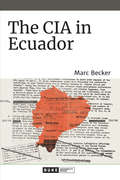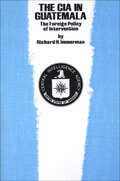- Table View
- List View
The CIA & American Democracy
by Rhodri Jeffreys-JonesThis edition of the &“brief, yet subtle and penetrating account&” of the CIA includes a new prologue covering the agency&’s more recent history (Christian Science Monitor). Now in its third edition, Rhodri Jeffreys-Jones&’s comprehensive history of the Central Intelligence Agency is widely acclaimed for its thorough and even-handed analysis. A renowned U.S. intelligence expert, Jeffreys-Jones chronicles the evolution of the agency from its beginning in 1947 to the present day. With clarity and acuity, he examines the CIA&’s activities during some of the most dramatic episodes in American history, from McCarthyism to the Bay of Pigs, the assassination of John F. Kennedy, the Iran-Contra affair, and many others. A new prologue by the author also covers the CIA&’s history from the end of the Cold War to the terror attacks of September 11th, 2001. A landmark of intelligence history since its first edition in 1989, The CIA and American Democracy is &“a judicious and reasonable...sophisticated study&” (David P. Calleo, New York Times Book Review).
The CIA As Organized Crime: How Illegal Operations Corrupt America And The World
by Douglas ValentineThe author of three books on CIA operations, Douglas Valentine began his research into the agency's activities when CIA director William Colby gave him free access to interview agency officials who had been involved in various aspects of the Phoenix program in South Vietnam. It was a permission Colby was to regret. The CIA would eventually rescind it and made every effort to impede publication of The Phoenix Program, which documented an elaborate system of population surveillance, control, entrapment, imprisonment, torture, and assassination in Vietnam. While researching Phoenix, Valentine learned that the CIA allowed opium and heroin to flow from its secret bases in Laos to generals and politicians on its payroll in South Vietnam. His investigations into this illegal activity focused on the CIA's relationship with the federal agencies mandated by Congress to stop illegal drugs from entering the United States. Based on interviews with senior officials, Valentine wrote two subsequent books, The Strength of the Wolf and The Strength of the Pack, showing how the CIA infiltrated federal drug enforcement agencies and commandeered their executive management, intelligence, and foreign operations staffs in order to ensure the unimpeded flow of drugs to traffickers and foreign officials in its employ. Ultimately, portions of his research materials were archived at the National Security Archive, Texas Tech University's Vietnam Center, and the John Jay College of Criminal Justice. This book includes excerpts from the aforementioned titles, along with subsequent articles and transcripts of interviews on a range of current topics, with a view to shedding light on the systemic dimensions of the CIA's ongoing illegal and extralegal activities. These articles and interviews illustrate how the agency's activities impact social and political movements abroad and at home. A common theme is the CIA's ability to deceive and propagandize the American public through its impenetrable, government-sanctioned shield of official secrecy and plausible deniability. Though investigated by the Church Committee in 1975, CIA praxis then continues to inform CIA praxis today. Valentine tracks the agency's steady expansion into practices targeting the last population to be subjected to the exigencies of the American empire: the American people themselves.
The CIA Insider's Guide to the Iran Crisis: From CIA Coup to the Brink of War
by John Kiriakou Gareth PorterWhy did the CIA overthrow Iran's democratically elected government? And why has the United States treated Iran as one of its biggest enemies for four decades? Is the Trump administration&’s &“Maximum Pressure&” campaign working, or will it precipitate a war with Iran?In The CIA Insider's Guide to Iran: from CIA Coup to the Brink of War, former CIA Officer John C. Kiriakou and investigative journalist and historian Gareth Porter explain how and why the United States and Iran have been either at war or threatening such a war for most of the forty years since Islamic Republic of Iran was established. The authors delve below the surface explanations for the forty-year history of extreme U.S. hostility toward Iran to blow up one official U.S. narrative after another about Iran and U.S. policy. Against the background of Iran&’s encounters with heavy-handed British and Russian imperialist control over its resources, this book shows how the U.S. began its encounter with Iran by clearly siding with British imperialism against Iranian aspirations for control over its oil in its 1953 overthrow of the Mossadegh government, then proceeded to actively support the Saddam Hussein regime&’s horrific chemical war against Iran. The book shows how a parade of politically-motivated false narratives have taken U.S. Iran policy progressively farther from reality for three decades and have now brought the United States to the brink of war with Iran. It explains how Donald Trump&’s trashing of the the nuclear deal with Iran and seeking to cut off Iran&’s oil exports creates a very high risk of such a war, demanding major public debate about changing course.The CIA Insider's Guide to the Iran Crisis also includes appendices with key official documents on U.S. policy toward Iran, with particular emphasis on the major official statements of the Trump administration&’s &“Maximum Pressure&” strategy.
The CIA UFO Papers: 50 Years of Government Secrets and Cover-Ups (Mufon Ser.)
by Dan WrightThe secret CIA papers that prove that the government has been tracking UFOs and extraterrestrials for over fifty years. In autumn 2016, the CIA sent to its website a cache of electronic files previously released under the Freedom of Information Act but housed at the National Archives. Among a variety of subjects were &“unidentified flying objects.&” Finally, a stockpile of reports and correspondences were available for serious UFO researchers to examine at home. This book consists of selections from those secret files. Dan Wright spent eighteen months selecting, editing, and organizing the 550 files that are relevant to UFO research and has produced a chronological collection of CIA documents spanning 1949 to 2000. Each chapter focuses on a particular year. The summary of documents for each year is followed by a section called &“While You Were Away from Your Desk,&” which provides historical and cultural context for the document summaries and examines other sightings and contacts that are not mentioned in the CIA files. Among the fascinating tidbits are: A memo to J. Edgar Hoover about flying saucer reports The 1949 conference at Los Alamos that include Edward Teller, upper atmosphere physicist Dr. Joseph Kaplan, and other renowned scientists in which the participants debated whether recent incidents were natural phenomena or UFO sightings This is a must-have book for those fascinated by the history of UFO sightings and those interested in government secrets and cover-ups.
The CIA World Factbook 2014
by Central Intelligence AgencyFrom Afghanistan to Zimbabwe, The CIA World Factbook 2014 offers complete and up-to-date information on the world’s nations. This comprehensive guide is packed with detailed information on the politics, populations, military expenditures, and economics of 2014.For each country, The CIA World Factbook 2014 includes: Detailed maps with new geopolitical data Statistics on the population of each country, with details on literacy rates, HIV prevalence, and age structure New data on military expenditures and capabilities Information on each country’s climate and natural hazards Details on prominent political parties, and contact information for diplomatic consultation Facts on transportation and communication infrastructure And much more!Also included are appendixes with useful abbreviations, international environmental agreements, international organizations and groups, weight and measure conversions, and more. Originally intended for use by government officials, this is a must-have resource for students, travelers, journalists, and businesspeople with a desire to know more about their world.
The CIA World Factbook 2015
by Central Intelligence AgencyFrom Afghanistan to Zimbabwe, The CIA World Factbook 2015 offers complete and up-to-date information on the world’s nations. This comprehensive guide is packed with detailed information on the politics, populations, military expenditures, and economics of 2015.For each country, The CIA World Factbook 2015 includes:Detailed maps with new geopolitical dataStatistics on the population of each country, with details on literacy rates, HIV prevalence, and age structureNew data on military expenditures and capabilitiesInformation on each country’s climate and natural hazardsDetails on prominent political parties, and contact information for diplomatic consultationFacts on transportation and communication infrastructureAnd much more!Also included are appendixes with useful abbreviations, international environmental agreements, international organizations and groups, weight and measure conversions, and more. Originally intended for use by government officials, this is a must-have resource for students, travelers, journalists, and business people with a desire to know more about their world.
The CIA World Factbook 2018-2019
by Central Intelligence AgencyThe ultimate, comprehensive guide to country-by-country statistics around the world.From Afghanistan to Zimbabwe, The CIA World Factbook 2018-2019 offers complete and up-to-date information on the world's nations. This comprehensive guide is packed with data on the politics, populations, military expenditures, and economics of 2018.For each country, The CIA World Factbook 2018-2019 includes: Detailed maps with new geopolitical data Statistics on the population of each country, with details on literacy rates, HIV prevalence, and age structure New data on military expenditures and capabilities Information on each country's climate and natural hazards Details on prominent political parties and contact information for diplomatic consultation Facts on transportation and communication infrastructureAlso included are appendixes with useful abbreviations, international environmental agreements, international organizations and groups, weight and measure conversions, and more. Originally intended for use by government officials, this is a must-have resource for students, travelers, journalists, and business people with a desire to know more about their world.
The CIA World Factbook 2019-2020
by Central Intelligence AgencyThe ultimate, comprehensive guide to country-by-country statistics around the world. From Afghanistan to Zimbabwe, The CIA World Factbook 2019-2020 offers complete and up-to-date information on the world's nations. This comprehensive guide is packed with data on the politics, populations, military expenditures, and economics of 2019. For each country, The CIA World Factbook 2019-2020 includes: Detailed maps with new geopolitical dataStatistics on the population of each country, with details on literacy rates, HIV prevalence, and age structureNew data on military expenditures and capabilitiesInformation on each country's climate and natural hazardsDetails on prominent political parties and contact information for diplomatic consultationFacts on transportation and communication infrastructure Also included are appendixes with useful abbreviations, international environmental agreements, international organizations and groups, weight and measure conversions, and more. Originally intended for use by government officials, this is a must-have resource for students, travelers, journalists, and business people with a desire to know more about their world.
The CIA World Factbook 2020-2021
by Central Intelligence AgencyFrom the world&’s most sophisticated intelligence gathering organization, here is the CIA&’s official country-by-country data on nations around the world.From Afghanistan to Zimbabwe, The CIA World Factbook 2020-2021 offers complete and up-to-date information on the world's nations. This comprehensive guide is packed with data on the politics, populations, military expenditures, and economics of 2020 and looks ahead to 2021.For each country, The CIA World Factbook 2020-2021 includes:Detailed maps with new geopolitical dataStatistics on the population of each country, with details on literacy rates, HIV prevalence, and age structureNew data on military expenditures and capabilitiesInformation on each country's climate and natural hazardsDetails on prominent political parties and contact information for diplomatic consultationFacts on transportation and communication infrastructureAlso included are appendixes with useful abbreviations, international environmental agreements, international organizations and groups, weight and measure conversions, and more. Originally intended for use by government officials, this is a must-have resource for students, travelers, journalists, and business people with a desire to know more about their world.
The CIA World Factbook 2021-2022
by Central Intelligence AgencyFrom the world&’s most sophisticated intelligence gathering organization, here is the CIA&’s official country-by-country data on nations around the world.From Afghanistan to Zimbabwe, The CIA World Factbook 2020-2021 offers complete and up-to-date information on the world's nations. This comprehensive guide is packed with data on the politics, populations, military expenditures, and economics of 2021 and looks ahead to 2022.For each country, The CIA World Factbook 2020-2021 includes:Detailed maps with new geopolitical dataStatistics on the population of each country, with details on literacy rates, HIV prevalence, and age structureNew data on military expenditures and capabilitiesInformation on each country's climate and natural hazardsDetails on prominent political parties and contact information for diplomatic consultationFacts on transportation and communication infrastructureAlso included are appendixes with useful abbreviations, international environmental agreements, international organizations and groups, weight and measure conversions, and more. Originally intended for use by government officials, this is a must-have resource for students, travelers, journalists, and business people with a desire to know more about their world.
The CIA World Factbook 2023-2024
by Central Intelligence AgencyThe ultimate, comprehensive guide to official country data and statistics, from the world&’s most sophisticated intelligence-gathering organization.From Afghanistan to Zimbabwe, The CIA World Factbook 2023-2024 offers complete and up-to-date information on the world's nations. This comprehensive guide is packed with data on countries' politics, populations, economics, and environment for 2023 and looks ahead to 2024.The CIA World Factbook 2023-2024 includes the following for each country:Brand new geopolitical mapsPopulation statistics, with details on languages, religions, literacy rates, age structure, HIV prevalence, and much moreUp-to-date data on military expenditures and capabilitiesGeography information, including climate and natural hazardsDetails on prominent political figures and partiesContact information for diplomatic missionsFacts on transportation, trade, and communication infrastructureAlso included are appendices with useful abbreviations, international environmental agreements, international organizations and groups, terror organizations, and more. Originally intended for use by government officials and policymakers as well as the broader intelligence community, this is a must-have resource for students, travelers, journalists, and anyone with a desire to know more about their world.
The CIA World Factbook 2024-2025
by Central Intelligence AgencyThe ultimate, comprehensive guide to official country data and statistics, from the world&’s most sophisticated intelligence-gathering organization. From Afghanistan to Zimbabwe, The CIA World Factbook 2024-2025 offers complete and up-to-date information on the world's nations. This comprehensive guide is packed with data on countries' politics, populations, economics, and environment for 2024 and looks ahead to 2025. The CIA World Factbook 2024-2025 includes the following for each country: Updated geopolitical maps Population statistics, with details on languages, religions, literacy rates, age structure, health indicators, and much more Up-to-date data on military expenditures and capabilities Geography information, including climate and natural hazards Details on prominent political figures and parties Contact information for diplomatic missions Facts on transportation, trade, and communication infrastructure Space program profiles for over 90 participating nations Also included are appendices with useful abbreviations, terror organization profiles, and more. Originally intended for use by government officials and policymakers as well as the broader intelligence community, this is a must-have resource for students, travelers, journalists, and anyone with a desire to know more about their world.
The CIA World Factbook 2025-2026
by Central Intelligence AgencyThe ultimate, comprehensive guide to official country data and statistics, from the world&’s most sophisticated intelligence-gathering organization. From Afghanistan to Zimbabwe, The CIA World Factbook 2025-2026 offers complete and up-to-date information on the world's nations. This comprehensive guide is packed with data on countries' politics, populations, economics, and environment for 2025 and looks ahead to 2026. The CIA World Factbook 2025-2026 includes the following for each country: Updated geopolitical maps Population statistics, with details on languages, religions, literacy rates, age structure, health indicators, and much more Up-to-date data on military expenditures and capabilities Geography information, including climate and natural hazards Details on prominent political figures and parties Contact information for diplomatic missions Facts on transportation, trade, and communication infrastructure Space program profiles for over 90 participating nations Also included are appendices with useful abbreviations, terror organization profiles, and more. Originally intended for use by government officials and policymakers as well as the broader intelligence community, this is a must-have resource for students, travelers, journalists, and anyone with a desire to know more about their world.
The CIA and Congress: The Untold Story from Truman to Kennedy
by David M. BarrettCareful history of the formative years of the Agency.
The CIA and the Congress for Cultural Freedom in the Early Cold War: The Limits of Making Common Cause (Studies in Intelligence)
by Sarah Miller HarrisThis book questions the conventional wisdom about one of the most controversial episodes in the Cold War, and tells the story of the CIA's backing of the Congress for Cultural Freedom. For nearly two decades during the early Cold War, the CIA secretly sponsored some of the world’s most feted writers, philosophers, and scientists as part of a campaign to prevent Communism from regaining a foothold in Western Europe and from spreading to Asia. By backing the Congress for Cultural Freedom, the CIA subsidized dozens of prominent magazines, global congresses, annual seminars, and artistic festivals. When this operation (QKOPERA) became public in 1967, it ignited one of the most damaging scandals in CIA history. Ever since then, many accounts have argued that the CIA manipulated a generation of intellectuals into lending their names to pro-American, anti-Communist ideas. Others have suggested a more nuanced picture of the relationship between the Congress and the CIA, with intellectuals sometimes resisting the CIA's bidding. Very few accounts, however, have examined the man who held the Congress together: Michael Josselson, the Congress’s indispensable manager—and, secretly, a long time CIA agent. This book fills that gap. Using a wealth of archival research and interviews with many of the figures associated with the Congress, this book sheds new light on how the Congress came into existence and functioned, both as a magnet for prominent intellectuals and as a CIA operation. This book will be of much interest to students of the CIA, Cold War History, intelligence studies, US foreign policy and International Relations in general.
The CIA and the Politics of US Intelligence Reform
by Brent DurbinExamining the political foundations of American intelligence policy, this book develops a new theory of intelligence adaptation to explain the success or failure of major reform efforts since World War II. Durbin draws on careful case histories of the early Cold War, the Nixon and Ford administrations, the first decade after the Cold War, and the post-9/11 period, looking closely at the interactions among Congress, executive branch seniors, and intelligence officials. These cases demonstrate the significance of two factors in the success or failure of reform efforts: the level of foreign policy consensus in the system, and the ability of reformers to overcome the information advantages held by intelligence agencies. As these factors ebb and flow, windows of opportunity for reform open and close, and different actors and interests come to influence reform outcomes. Durbin concludes that the politics of US intelligence frequently inhibit effective adaptation, affecting America's security and the civil liberties of its citizens.
The CIA at War: Inside the Secret Campaign Against Terror
by Ronald KesslerA “colorful and fascinating” history of the CIA and its clandestine activities overseas from the Cold War to 9/11 and the War on Terror (The Washington Post Book World).Investigative reporter Ronald Kessler draws on his unprecedented access to CIA insiders to tell the full story of the agency and its spymasters. Kessler interviewed numerous current and retired CIA officers, including George Tenet and other top officials. He recounts the story of how Tenet transformed the CIA from a pathetic, risk averse outfit to one that has rounded up thousands of terrorists since 9/11.The CIA at War discloses highly sensitive information about its unorthodox methods, its stunning successes, and its shocking failures. The book explores whether the CIA can be trusted, whether its intelligence is politicized, and whether it is capable of winning the war on terror. In doing so, the book weaves in the history of the CIA and how it really works.From the CIA’s intelligence failure of 9/11 to its critical role in preventing further attacks, The CIA at War tells a riveting, unique story about a secretive, powerful agency and its confrontation with global terrorism.
The CIA in Ecuador (American Encounters/Global Interactions)
by Marc BeckerIn The CIA in Ecuador Marc Becker draws on recently released US government surveillance documents on the Ecuadorian left to chart social movement organizing efforts during the 1950s. Emphasizing the competing roles of the domestic ruling class and grassroots social movements, Becker details the struggles and difficulties that activists, organizers, and political parties confronted. He shows how leftist groups, including the Communist Party of Ecuador, navigated disagreements over tactics and ideology, and how these influenced shifting strategies in support of rural Indigenous communities and urban labor movements. He outlines the CIA's failure to understand that the Ecuadorian left was rooted in local social struggles rather than bankrolled by the Soviet Union. By decentering US-Soviet power struggles, Becker shows that the local patterns and dynamics that shaped the development of the Ecuadorian left could be found throughout Latin America during the cold war.
The CIA in Guatemala: The Foreign Policy of Intervention (Texas Pan American Series)
by Richard H. ImmermanUsing documents obtained through the Freedom of Information Act, recently opened archival collections, and interviews with the actual participants, Immerman provides us with a definitive, powerfully written, and tension-packed account of the United States' clandestine operations in Guatemala and their consequences in Latin America today.
The CIA in Hollywood: How the Agency Shapes Film and Television
by Tricia JenkinsWhat’s your impression of the CIA? A bumbling agency that can’t protect its own spies? A rogue organization prone to covert operations and assassinations? Or a dedicated public service that advances the interests of the United States? Astute TV and movie viewers may have noticed that the CIA’s image in popular media has spanned this entire range, with a decided shift to more positive portrayals in recent years. But what very few people know is that the Central Intelligence Agency has been actively engaged in shaping the content of film and television, especially since it established an entertainment industry liaison program in the mid-1990s. The CIA in Hollywood offers the first full-scale investigation of the relationship between the Agency and the film and television industries. Tricia Jenkins draws on numerous interviews with the CIA’s public affairs staff, operations officers, and historians, as well as with Hollywood technical consultants, producers, and screenwriters who have worked with the Agency, to uncover the nature of the CIA’s role in Hollywood. In particular, she delves into the Agency’s and its officers’ involvement in the production of The Agency, In the Company of Spies, Alias, The Recruit, The Sum of All Fears, Enemy of the State, Syriana, The Good Shepherd, and more. Her research reveals the significant influence that the CIA now wields in Hollywood and raises important and troubling questions about the ethics and legality of a government agency using popular media to manipulate its public image.
The CIA in Hollywood: How the Agency Shapes Film and Television
by Tricia JenkinsAn in-depth study of the CIA’s collaboration with Hollywood since the mid-1990s, and the important and troubling questions it creates.What’s your impression of the CIA? A bumbling agency that can’t protect its own spies? A rogue organization prone to covert operations and assassinations? Or a dedicated public service that advances the interests of the United States? Astute TV and movie viewers may have noticed that the CIA’s image in popular media has spanned this entire range, with a decided shift to more positive portrayals in recent years. But what very few people know is that the Central Intelligence Agency has been actively engaged in shaping the content of film and television, especially since it established an entertainment industry liaison program in the mid-1990s.The CIA in Hollywood offers the first full-scale investigation of the relationship between the Agency and the film and television industries. Tricia Jenkins draws on numerous interviews with the CIA’s public affairs staff, operations officers, and historians, as well as with Hollywood technical consultants, producers, and screenwriters who have worked with the Agency, to uncover the nature of the CIA’s role in Hollywood. In particular, she delves into the Agency’s and its officers’ involvement in the production of The Agency, In the Company of Spies, Alias, The Recruit, The Sum of All Fears, Enemy of the State, Syriana, The Good Shepherd, and more. Her research reveals the significant influence that the CIA now wields in Hollywood and raises important and troubling questions about the ethics and legality of a government agency using popular media to manipulate its public image.“Fascinating, highly readable . . . Overall, Jenkins’s work is fresh and original, and demonstrates sound scholarship. The author has a passion for the topic that translates to vibrant writing. It is also a concise as well as entertaining look at an aspect of the CIA—its media relations with Hollywood—of which little is known. Enthusiastically written and incorporating effective, illustrative case studies, The CIA in Hollywood is definitely recommended to students of film, media relations, the CIA, and U.S. interagency relations.” —H-War
The CIA in Hollywood: How the Agency Shapes Film and Television
by Tricia JenkinsAn in-depth study of the CIA’s collaboration with Hollywood since the mid-1990s, and the important and troubling questions it creates.What’s your impression of the CIA? A bumbling agency that can’t protect its own spies? A rogue organization prone to covert operations and assassinations? Or a dedicated public service that advances the interests of the United States? Astute TV and movie viewers may have noticed that the CIA’s image in popular media has spanned this entire range, with a decided shift to more positive portrayals in recent years. But what very few people know is that the Central Intelligence Agency has been actively engaged in shaping the content of film and television, especially since it established an entertainment industry liaison program in the mid-1990s.The CIA in Hollywood offers the first full-scale investigation of the relationship between the Agency and the film and television industries. Tricia Jenkins draws on numerous interviews with the CIA’s public affairs staff, operations officers, and historians, as well as with Hollywood technical consultants, producers, and screenwriters who have worked with the Agency, to uncover the nature of the CIA’s role in Hollywood. In particular, she delves into the Agency’s and its officers’ involvement in the production of The Agency, In the Company of Spies, Alias, The Recruit, The Sum of All Fears, Enemy of the State, Syriana, The Good Shepherd, and more. Her research reveals the significant influence that the CIA now wields in Hollywood and raises important and troubling questions about the ethics and legality of a government agency using popular media to manipulate its public image.“Fascinating, highly readable . . . Overall, Jenkins’s work is fresh and original, and demonstrates sound scholarship. The author has a passion for the topic that translates to vibrant writing. It is also a concise as well as entertaining look at an aspect of the CIA—its media relations with Hollywood—of which little is known. Enthusiastically written and incorporating effective, illustrative case studies, The CIA in Hollywood is definitely recommended to students of film, media relations, the CIA, and U.S. interagency relations.” —H-War
The CIA's Greatest Hits
by Mark ZepezauerThis book provides concise descriptions of forty-eight of the CIA's most heinous crimes-- and that's far from a complete list.
The CIA's Secret War in Tibet
by Kenneth Conboy James MorrisonBased on conversations with those involved and surviving documentation.
The CIA, the British Left and the Cold War: Calling the Tune? (Studies in Intelligence)
by Hugh WilfordShortly after it was founded in 1947, the CIA launched a secret effort to win the Cold War allegiance of the British left. Hugh Wilford traces the story of this campaign from its origins in Washington DC to its impact on Labour Party politicians, trade unionists, and Bloomsbury intellectuals
